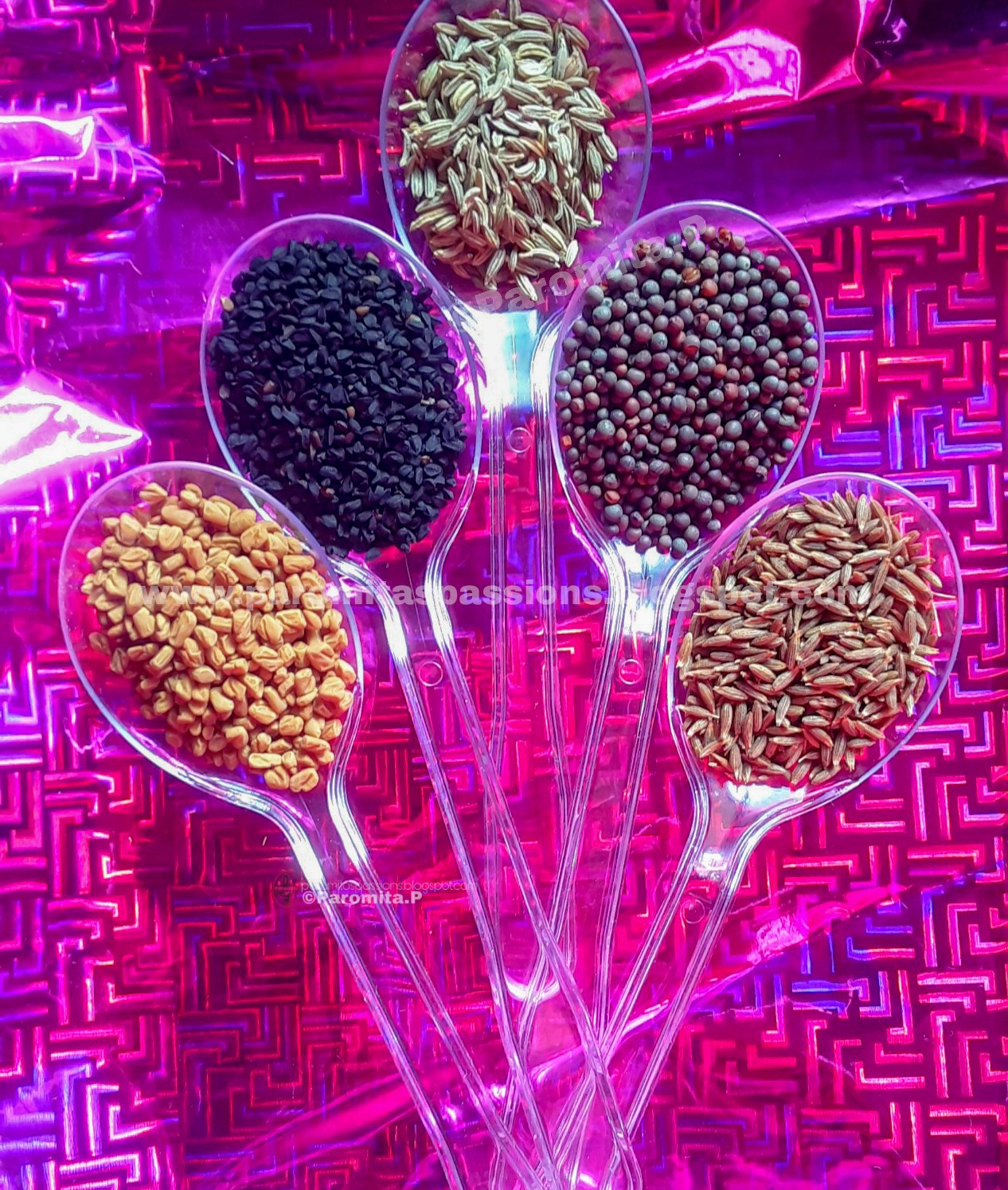Panch Phoran
Panch Phoran is a blend of five important seeds commonly used in the Bengali Cuisine. Paanch Phoron (পাঁচ ফোড়ন) is actually a Bengali language, also pronounced as Paanch Phodong, which literally means Five Spices (Paanch= Five, Phoron= Condiment/ Seasoning Spices). This Paanch Phoron is widely used in most of the recipes in Bengali dishes, we often start the recipe by seasoning these 5 seeds. It is an age-old tradition to keep a jar of Paanch Phoron in every Bengali Kitchen shelves. Paanch Phoron mainly includes Brown Mustard seeds, Nigella seeds, Fenugreek seeds, Cumin seeds, and Fennel seeds. Apart from these five main ingredients of Paanch Phoron, Bengalis also use the Tej Pata (Bay leaf) and dry red Mirchi for seasoning in most of the Bengali culinary recipes.
Paanch Phoron is also pronounced as Panch Phoran in Hindi (पंच फोरन), and it is used in other parts of India too. However, people from West Bengal, Orissa and other North-Eastern States, and Bangladesh are the ones to carry on the legacy of seasoning their recipes with the Paanch Phoron. The whole concept is to put these five type of seeds into the hot oil for seasoning and wait until the seeds pop out bringing a flavorful aroma to the dishes. Paanch Phoron is mainly added to the vegetarian recipes, however, we Bengalis tend to experiment in each and every aspects of the culinary dishes, by adding the Paanch Phoron for non-veg recipes too.
- Cumin Seeds, which is commonly known in Hindi as Jeera (जीरा), and also in Bengali it is called Jeera (জিরা বীজ). Cumin seeds are also seasoned separately in many Bengali recipes. Sometimes we roast the cumin seeds and coarsely grind them into powder to add a sensuous aroma to the dishes. We use both the seeds and grounded version to a great extent in most of the Indian recipes.

Cumin Seeds - Brown Mustard Seeds are called as Sarso (सरसों के बीज) or rye (राई) in Hindi and Sorsha (সরিষা বীজ) in Bengali. Mustard seeds are very commonly used in almost every part of the country for most of the recipes. Bengalis make a paste out of mustard and store in a jar which is better known as Kasundi or Shorse Bata (সরিষা গুঁড়া) mustard powder which is widely used in fish recipes. Out of all the five seeds, probably Mustard and Cumin play a vital role in a number of recipes in India.

Brown Mustard Seeds - Fennel Seeds can be eaten or chewed raw. We normally savor the fennel seeds along with Mishri (sweetener) after every meal for good digestion. These fennel seeds are mixed with the sugar cubes and served in a small plate after meals in every restaurants and hotel in India. We Bengalis call it Mouri(মৌরি) and in Hindi it is called Saunf (सौंफ).

Fennel Seeds - Nigella Seeds is known as Kalo jeera (কালো জিরা) in Bengali. People from the suburbs of Kolkata and also most of the people from Bangladesh widely use the nigella seeds in many recipes. They season these seeds apart from the other five in most of the vegetarian and fish recipes.

Nigella Seeds - Fenugreek Seeds or Methi (मेंथी) are the spices that play an important role in making a dish more flavorful. Indian cuisine is especially known to have some of the healthiest traditional recipes with fenugreek as its main ingredients. Fenugreek leaves are very healthy and has medicinal values, also the seeds are recommended for home remedies (घर के नुस्खे), and are very much curative for cold and fever.

Fenugreek Seeds
This is how we blend the five magical aromatic seeds, these are generally combined together and stored in a jar for the immediate use of seasoning purposes. Paanch Phoron is usually fried in oil or ghee before adding any vegetables while cooking, it flavors the oil, leaving mild smell from the seeds which make the dish absolutely delicious and relishing to the aroma of these Indian spices. Many authentic Bengali recipes depend on the Paanch Phoron made of these five different spices. This condiment is readily available in the markets and grocery stores in Kolkata. Preparation of any dishes with these five spices can make your diet healthy and extraordinarily tasty at the same time.
Paromita Pramanick ©2018. All Rights Reserved.






No comments: